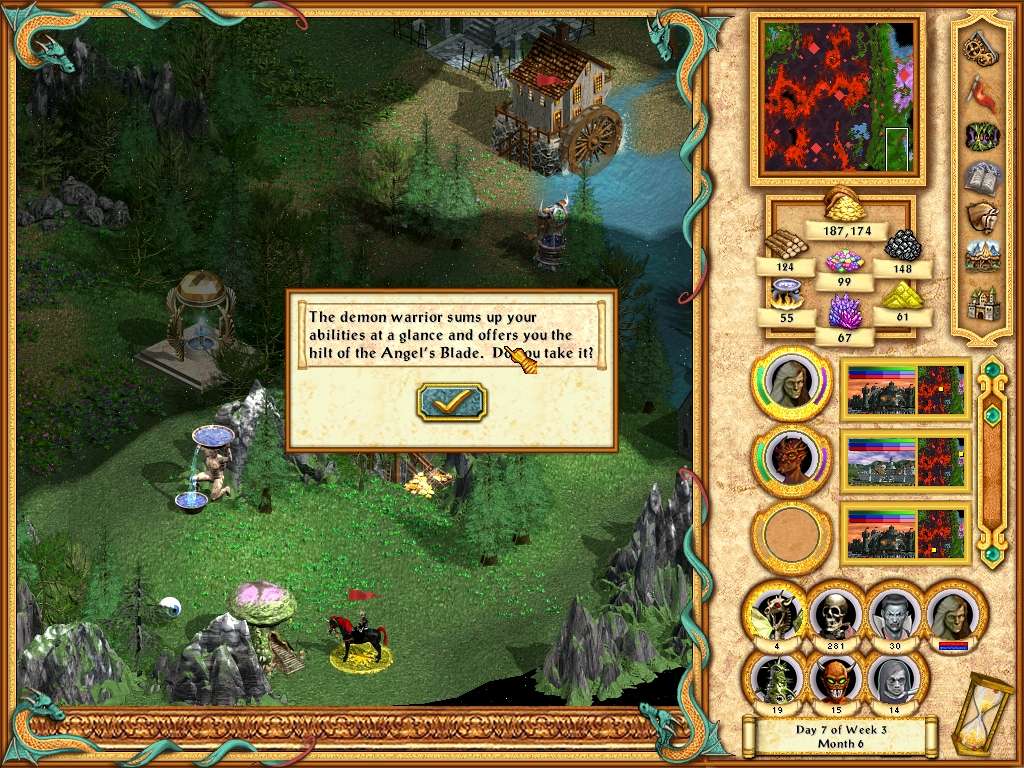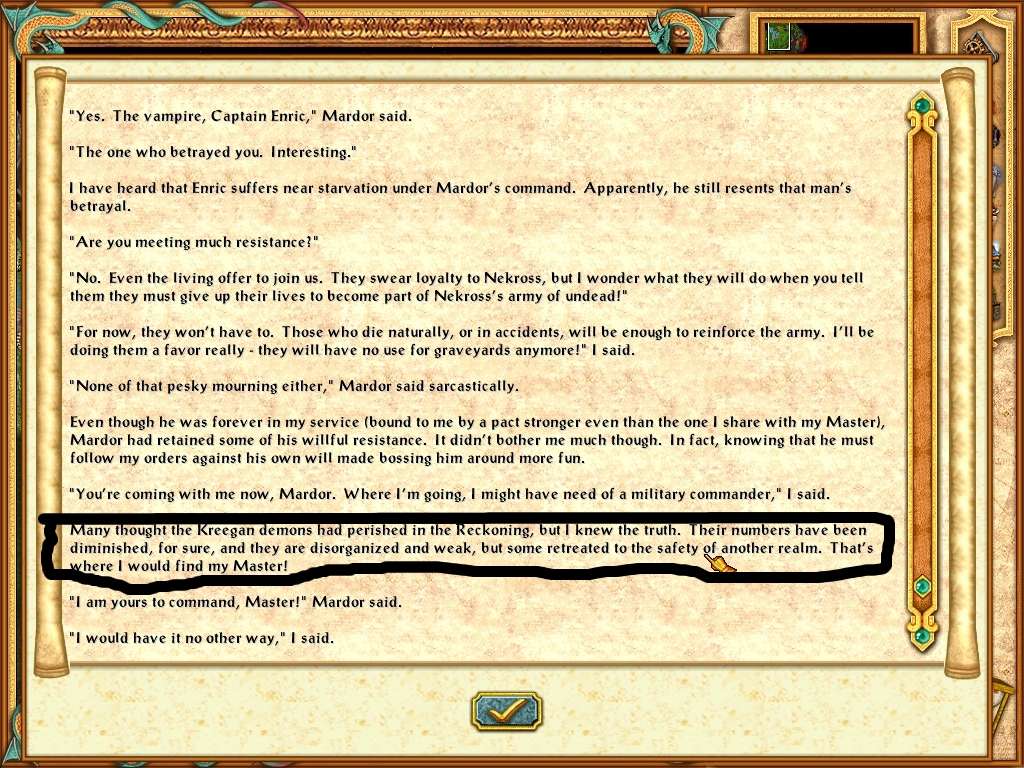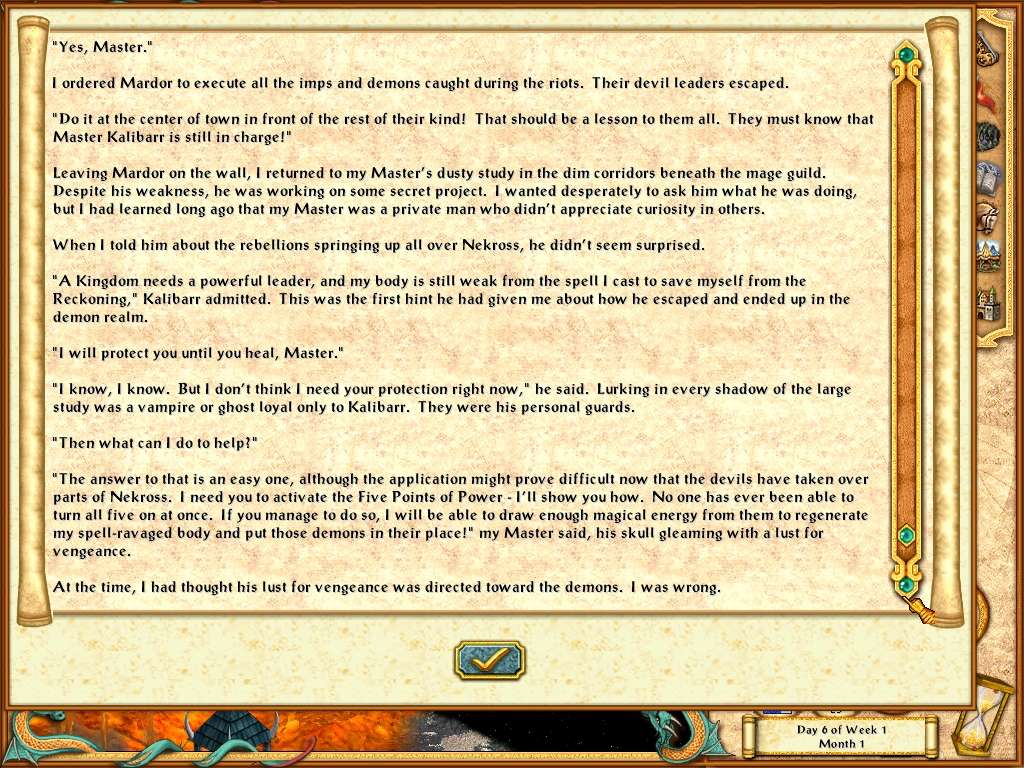That Nicolai is mad is not a factual statement, but a spurious interpretation. Unless you can find actual references that refer to Nicolai's madness, it is not legitimate to ignore what he says about Enroth in such a fashion.Secret_Holder wrote: No it is not a factual statement, when it's coming from a madman.
Especially when we have no other sources to refer to what was going on Enroth before the Reckoning.
The Kreegans were already in Axeoth long before Gauldoth opened up the portal to the Fiery Realm. There is no source in Heroes IV that says otherwise and plenty that say so.Corlagon wrote: Yes, we do and XEL II and I have probably posted it ten times at this stage, but here we go again. The Kreegans left Enroth for the Fiery Realm. Gauldoth took the Kreegans to Axeoth with him when he invaded the Fiery Realm. Thus Escaton and Gauldoth are both correct and we don't have to come up with nonsense like "all the Kreegans faked their deaths". It's a way better explanation than saying MM8 is wrong.
That is not only obvious from the games, but also is referenced by the fact that *before* the portal is opened, a Demon gives an Angel's Blade to Gauldoth, as part of this quest.

(I had to march Gauldoth all the way back from inside the Fiery Realm to get your the above picture since the demon also apparently gives it to the Paladin as well and I got an Angel Blade off him instead)

The second statement is quite clear, many thought that the Kreegans had perished in the Reckoning. Might and Magic VIII is not the Reckoning, it is *before* the Reckoning.
There is no way that even I could read *in the Reckoning* as *before the reckoning* Corlagon. They were present in Enroth-world before the Reckoning happened, that is a canonical fact. If you still need more evidence, read this source from the Points of Power Mission (the one directly after the Fiery Realm).

There is no evidence whatsoever of any demonic invasion through the portals to the Fiery Realm. Any event that major would be noticed, especially as it happened right inside Nekross, which directly concerns Gauldoth and Kalibarr.
What happens if a rebellion of the demons, a rebellion of the existing demons already living in Axeoth. We know therefore that when Gauldoth speaks of some of the Kreegans fleeing into the Fiery Realm and when he reffers to them being disorganized and weak; with their numbers reduced he is reffering to two different groups of Kreegans. The latter group is those who fled with the other refugees into Axeoth.
That group lived on under the boot-heel of the necromancers, rebelling as becomes clear because they sensed that Kalibarr is weak thus the time to overthrow them.
Yes we do not know precisely *how*, but I used basic logic to determine that any large percentage of the entire population of Kreegans cannot leave the planet in such a short time by direct magical means, when the use of such means to transport 1 person nearly killed Kalibarr (and since the majority of Kreegans are not powerful spell-casters) they must have some sort of portals in existence within easy reach to leave through.Corlagon wrote: When did Gauldoth specify they fled Enroth when the Reckoning happened, through portals? Nowhere. He simply doesn't. We don't know when/how they left the planet.
So your statement is incorrect on two counts. See the subtlety? You're reading into a source, mixing in your own conclusions and reporting them as fact. That's the difference between canon and fanfiction.
But we know exactly *when* they fled to the Fiery Realm, at the Reckoning. We have no strictly canonical sources to state HOW they tricked the people of Might and Magic VIII, but it is evidently canonical that they were wrong and thus were tricked.
But logically, if a large portion of the Kreegan population can be evacuated into the Fiery Realm at a moment's notice, then with a lot more time and organization, the whole Kreegan population could be evacuated. They did this to escape Escaton, which deliberately or undeliberately tricked him.
And having created the magical means of escape, they could then use it again to escape to the Fiery Realm at the Reckoning.
Except that's not the way have have been acting in relation to yourself.Corlagon wrote: Well maybe that's because I've administrated the MM wiki for over a year in my free time and deal with nothing but sources and references wink. But I disagree. All sources are totally credible. It's the interpretations and conclusions which stem from them that I can't help but challenge.
You have thus far dismissed several sources from Heroes IV, a source from Might and Magic IX and at the same time promoting an utterly fan-fiction (by your own definition) Kreegan invasion from the Fiery Realm, which has not a shred of canonical evidence to back it up and doesn't even fill up any legitimate gaps, since if it had happened we *would* definitely know about it from canonical sources.
There is no canonical Kreegan invasion from the Fiery Realm, it is canonical some of the Kreegans went there but they never came back (in Heroes IV timeline anyway). Those Kreegans that didn't go there and traveled through the portals to Axeoth like everyone else, continued to have an influence on the story.
While can probably conclude that such an invasion was being planned in the future,(they aren't giving away Angel Blade's for nothing) or that a small number of Kreegans secretly sneaked through, but that is the furthest we can legitimately go without engaging in not merely fanfiction, but actual falsification. To conclude with my definitions of canon, theory, fan-fiction and falsification.
Canon (what I am not writing)
A direct reference from a story. There is however no requirement that a canonical statement be correct if it contradicted by another canonical reference, because a character in a story can be canonically wrong (mistaken or deceived). They are also subject to interpretation as to their actual direct meaning and to what actually constitutes canon.
Theory (what I am writing)
This is a wider understanding of a story derived from an interpretation of the canonical sources, which attempts to harmonize and bring together all the various references. Theories are important for the purpose of resolving contradictions between canonical sources, by determining why and how the sources are mistaken within the context of the story. It is impossible for a story to be coherent without theorizing and function on the basis of source-interpretation alone if it has contradictory sources, unless it is specifically claimed in the story that a source is mistaken. Any theory is however an interpretation of the meaning of several canonical sources taken together.
Fan-Fiction (what I am not writing)
This is an addition story created in order to expand an existing story, usually by fans of the story, but without them having the authority to write a sequel. To be Fan-Fiction rather than theory, it is necessary to invent sources to fill in gaps within the storyline, what happened in places and times uncovered by the story for instance. A theory does not however become fan-fiction however extensive it becomes, as long as it's foundation is the canonical sources or information previously derived from canonical sources about the story.
If I were to for instance to write a whole time-line or campaign concerning what goes on after Heroes IV (as I intend to do), that would be fan-fiction. However explaining the external origin of events within the story is not fan-fiction but theory as long as the explanations are other canonical events.
If you were say to explain the origin of an invading group of creatures in relation to a land already canonically referenced that is theory. However if one invents a new land not referenced to explain their origin, that is fan-fiction.
Falsification (what I am hopefully not writing)
Falsification is knowingly or unknowingly writing fan-fiction or theory that is illegitimate because it directly states contrary to canonical sources. If the canonical sources claim that Gauldoth rescued Kalibarr from the Fiery Realm, to write that Emilia Nighthaven rescued Kalibarr instead is Falsification (but to claim that before Gauldoth Emilia tried to rescue Kalibarr but failed, but Gauldoth succeeded later is fan-fiction).
Also to claim that events too great to avoid notice occurred at canonically referenced times and places, is also Falsification, unless those events happened in such a way as they could conceivably avoid notice by the referenced sources, in which case they are either theory or fan-fiction depending upon their basis.
For instance to claim that a small group of Kreegans sneaked through the portal created by Gauldoth to rescue Kalibarr is not Fan-Fiction, but to claim that there was a full Kreegan invasion during the Heroes IV death campaign era is Falsification because such an event could not conceivably have avoided notice by the authorities in Nekross.











